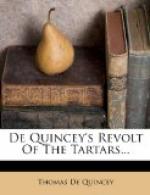1 18. leeming. The lemming, or leming. A rodent quadruped. “It is very prolific, and vast hordes periodically migrate down to the sea, destroying much vegetation in their path.”—Century Dictionary.
1 22. Miltonic images. “Miltonic” here characterizes not only images used by Milton, but images suggestive of his as well. Yet compare:
Or
from above
Should intermitted vengeance arm again
His red right hand to plague us?
—Paradise
Lost, II, 172-4.
Or,
with solitary hand
Reaching beyond all limit, at one blow
Unaided could have finished thee.
—Paradise
Lost, VI, 139-41.
2 12. sanctions. The word here means not permission, nor recognition merely, but the avowal of something as sacred, hence obligatory; a thing ordained.
2 13, 14. a triple character. De Quincey is fond of thus analyzing the facts he has to state. Notice how this method of statement, marked by “1st,” “2dly,” “3dly,” contributes to the clearness of the paragraph.
2 17. “Venice Preserved.” A tragedy by Thomas Otway, one of the Elizabethan dramatists (1682).—“Fiesco.” A tragedy by the great German dramatist Friedrich Schiller (1783), the full title of which is The Conspiracy of Fiesco at Genoa.
2 22. Cambyses, the Third (529-522 B.C.). He was king of Persia and led an expedition into Ethiopia, which ended disastrously for him.
2 23. anabasis. The word itself means “a march up” into the interior.—katabasis (l. 28) means “a march down,”—in this case the retreat of the Greeks. The Anabasis of the Greek historian Xenophon is the account of the expedition of Cyrus the Younger against Artaxerxes, which ended with the death of Cyrus at the battle of Cunaxa (401 B.C.).
2 25. Crassus. A Roman general who led an army into Parthia (or Persia) (54 B.C.). He was defeated and put to death by torture.—Julian (l. 26), the Apostate, lost his life while invading Persia (363 A.D.).
2 28. the Russian anabasis, etc. The historic invasion of Russia by the armies of Napoleon in 1812, followed by the terrible retreat from Moscow.
3 3. This triple character, etc. Note this method of making clear the connection between paragraphs. Make close study of these paragraphs; analyze their structure. Compare the manner of introducing subsequent paragraphs.
3 14. Wolga. The German spelling. The Volga is the longest river in Europe. It is difficult to locate with certainty all the points here mentioned.
3 16. Koulagina was a fort somewhere on the Ural river; perhaps to be identified with Kulaschinskaja, or Kologinskaia.
3 17. Cossacks. A people of mixed origin, but of Russian rather than Tartar stock. There are two branches, the Ukraine and the Don Cossacks. This people is first heard of in the tenth century. The title of the leader was Hetman; the office was elective and the government was democratic. The Cossacks have been noted always as fierce fighters and are valuable subjects of the czar. The Bashkirs (l. 18) are Mongolians and nomadic in their habits.




